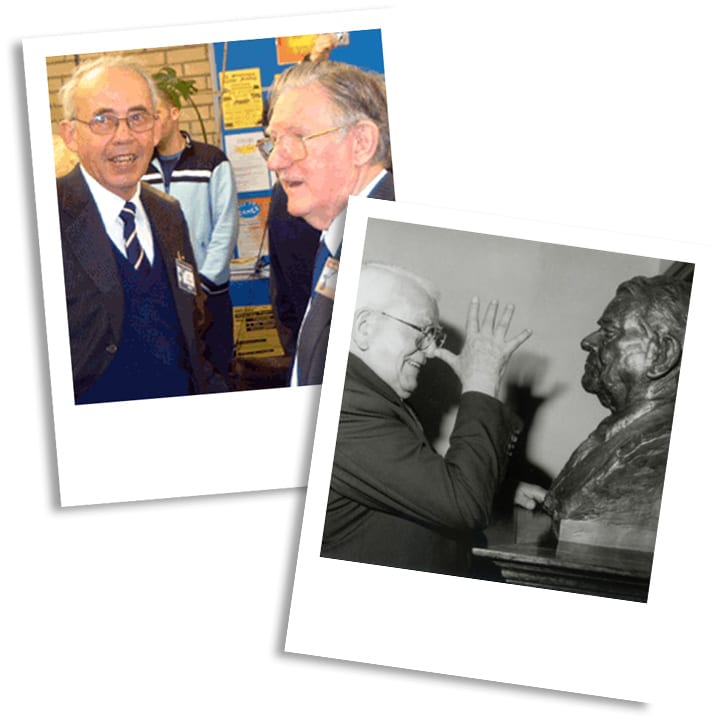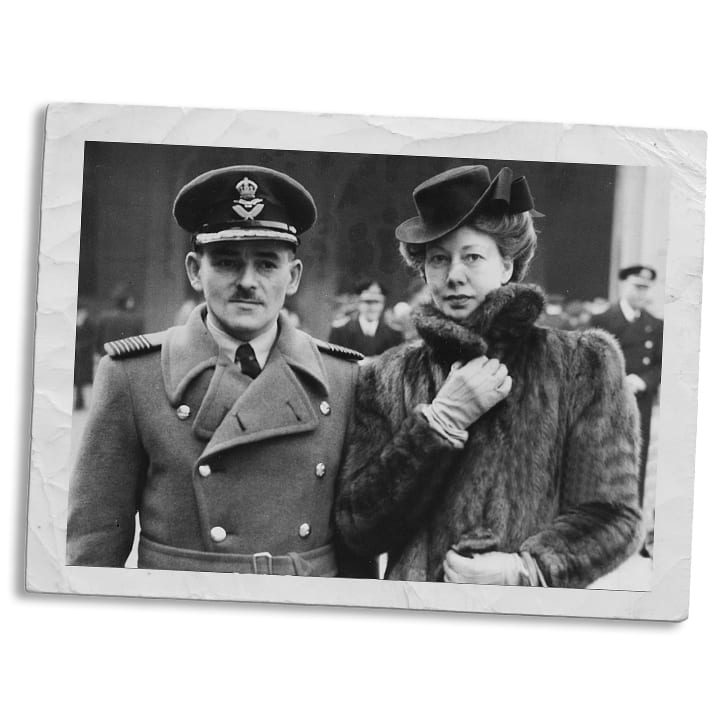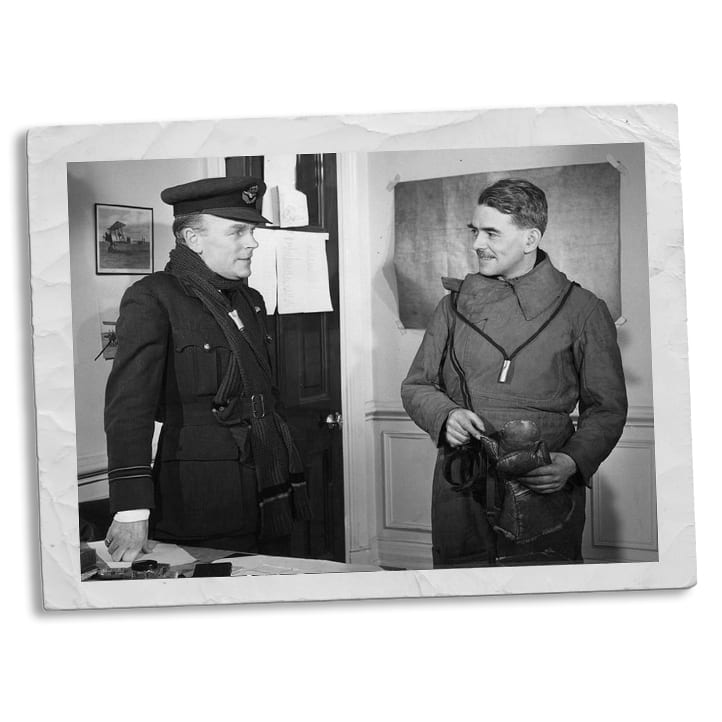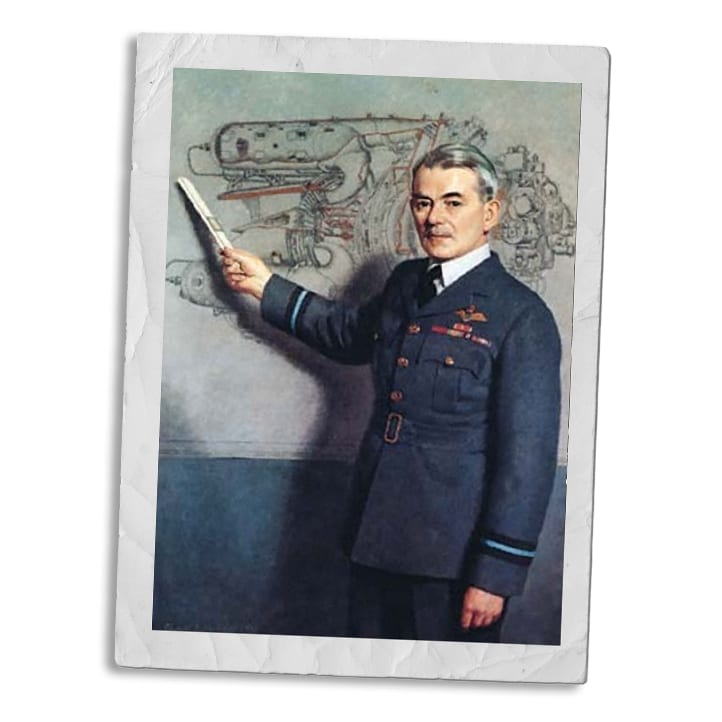
A personal recollection by Roy Fowkes, CEng FRAeSFInstE MIMechE
There is no doubt that I was both very fortunate and privileged to have been so closely associated with Sir Frank Whittle. A wonderful friend and a man who became the greatest engineer of this century, he was a modest genius and had many attributes other than just sheer technical brilliance. He had, in addition, courage, determination, dignity and generosity, together with an infectious sense of humour.
Roy Fowkes (right) with Sir Frank Whittle’s son Ian at a reception for the Reactionaries to coincide the the unveiling of the E28/39 at Lutterworth.
I first met Sir Frank when, in 1944, I joined Power Jets at Whetstone, near Leicester, as an Engineering Apprentice. It was my good fortune to form a close association with him in 1980 when he visited the UK to attend a celebratory function that I had instigated in conjunction with a fellow Reactionary. This was Sir Frank’s first visit to the UK since his marriage to his American wife Hazel in 1976. After that, for 16 years, Sir Frank and Lady Whittle were my house guests on many occasions, and my wife and I enjoyed holidays with them in the USA. His knowledge on a whole host of subjects never ceased to amaze me and in my many conversations with him he was always informative, articulate and very interesting to listen to.
English Royal Air Force engineer Sir Frank Whittle, inventor of the turbojet engine, with his wife Hazel, circa 1945.

His relating of stories of his past was full of the smallest details such as names, places and dates, etc. His memory was quite exceptional, especially when one takes into account his extensive itinerary over so many years. On numerous occasions I was present with his friends and others who were reduced to fits of laughter following the telling of many stories, usually of his flying days at Cranwell.
Until 1995, when his eyesight started to fail, he was an avid reader of all sorts of material, and in addition was kept very busy dealing with mail from around the globe. He did worry that he might suffer in the later years of his life from memory loss and to counteract this he read and studied quite extensively, at other times spending his time solving puzzles in order to keep his mind active. He certainly had no need to worry; his brain and mind were active right up to the end.

Sir Frank was also a dedicated Englishman and exceedingly proud of his country, and never stopped talking about it. Furthermore, he had tremendous respect for the RAF, which he held in high esteem and considered to be the finest service anywhere in the world. Incidentally, he always gave credit for his success, both privately and publicly, to the training that he received at Cranwell, both as an apprentice and as a cadet. One thing he did always regret, however, was that jet aircraft did not make a major contribution to Britain’s war effort, as he had hoped.
Sir Frank Whittle (right) and Mr Patrick Johnson, managing director of Power Jets (Research and Development) Ltd, re-enacting the Cranwell sequence.
I would like to take this opportunity to state that he did not leave England out of bitterness, as some people have suggested, but left to take up an appointment as a Navair Research Professor with the US Naval Academy at Annapolis and to be with his American wife. Naturally in 1946 he was upset when he and his company, Power Jets, lost the right to build aero engines. After all, it had been his life’s work since the 1930’s and involved years of struggle to bring his ideas to fruition. Neither did he ever suggest that he never received the acclaim he deserved. In fact he received a great many awards worldwide which adorned his home, although some may have been a little late in coming. He was also proud to have been the first Old Cranwellian to be knighted. However the award of the Order of Merit in 1986 was his greatest thrill and he was absolutely delighted to receive the award from Her Majesty.
Some months before Sir Frank passed away he made arrangements for all his historic papers, etc. relating to his life’s work to be given to the Nation. These are now located at Churchill College, Cambridge University. I, along with many thousands of others, regretted his passing. Sir Frank was a credit to his country and to the RAF, in which he served with distinction and love. He was a wonderful human being, a great friend and my life has been enriched by knowing him.

